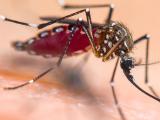Nov 12, 2010
Study looks at severe pandemic H1N1 cases in postpartum women
A study from California describes 15 severe cases of 2009 H1N1 influenza in postpartum women. Researchers sifted reports of H1N1-related hospitalizations and deaths in California in 2009 for cases in women within the first 6 months after giving birth, according to their report in the American Journal of Obstetrics and Gynecology (AJOG). Healthcare providers in California were asked to report all hospitalized H1N1 cases from Apr 23 to Aug 11, but for the rest of the year reporting was limited to patients admitted to intensive care. Of the 15 cases identified, 11 of the women got sick within the first postpartum week. Four of the 10 hospitalized patients reported through Aug 11 needed intensive care, and 2 died. Of the five patients who needed intensive care after Aug 11, one died. Seven of the women had underlying conditions, most commonly asthma, that increased their risk of complications. The authors say their findings support the Centers for Disease Control and Prevention (CDC) recommendation that women in the first 2 postpartum weeks should be promptly treated with oseltamivir if 2009 H1N1 illness is suspected, but they add that more data are needed to better define the period of increased risk.
Nov 12 AJOG report
Genetically altered mosquitoes released to fight dengue
UK scientists who released genetically altered mosquitoes to fight dengue in the Cayman Islands found the experiment lowered mosquito numbers by 80%, according to an Associated Press (AP) report. Scientists involved in the project say it is the first time genetically modified mosquitoes have been released in the wild. Penn State biologist Andrew Read, who was not involved in the project, said the test could be an important step in disease control "Anything that could selectively remove insects transmitting really nasty diseases would be very helpful," he said. Researchers at Oxford-based Oxitec Limited used DNA manipulation to develop sterile male Aedes aegypti mosquitoes, then released 3 million of them in the Cayman Islands to mate with wild female mosquitoes, rendering them unable to produce offspring. They released batches of the male mosquitoes three times a week in a 40-acre area from May to October. By August, mosquito numbers in the test area dropped 80% compared with a neighboring area. An Oxitec official said that an experiment in such a small area cannot produce a detectable drop in dengue cases, but it might have an impact if done on a larger scale. He also said that, to rid endemic areas of dengue, billions of the modified mosquitoes would likely be needed.
Researchers say adults may not be major factor in pertussis transmission
A study from the University of Michigan suggests that the spread of pertussis may have more to do with frequent social interactions among teenagers than with transmission from infected adults to younger people. The study was published in today's issue of Science. A university press release notes that pertussis has made a comeback in some developed countries since the 1980s, while the burden of cases has dropped in preschool children and increased in teenagers. The researchers looked at data from Sweden, where routine infant pertussis vaccination was interrupted from 1979 until 1996, and scientists gathered data on pertussis incidence by age-group during and after the hiatus. The Michigan researchers also used findings from a 2008 study in which more than 7,000 Europeans kept track of all their interactions with others on one day—a key finding of which was that children interacted far more with other children than with adults. The Michigan group used the contact data in developing a mathematical model of pertussis transmission and compared the model's predictions with the Swedish findings. They found that it accurately predicted declines in pertussis cases in Swedish infants, toddlers, and adults and the increase in cases among teenagers with the resumption of vaccination. Coauthor Aaron King said the findings suggest that the role of adults in transmission is "minimal" and that blanket booster vaccination of adults is unlikely to be a very efficient way to control the disease, according to the release. But the researchers said that because they used incidence data from Sweden, it's uncertain how the results apply to the United States, where infant vaccination rates are lower.
Nov 12 Science abstract
Flu-related deaths in South African elderly 2 to 4 times higher than in US
In an effort to address the dearth of data in low- and middle-income countries, researchers in South Africa determined that flu-related deaths in seniors in that country were two to four times higher than the rate in the United States. Their analysis of age-specific mortality data from 1998 through 2005 found excess mortality rates of 63 deaths per 100,000 population for influenza and pneumonia, compared with 21 per 100,000 in the United States. The mean percentage of winter deaths attributed to flu was 16% in South Africa compared with 6% in the United States.
Nov 10 Clin Infect Dis abstract


















